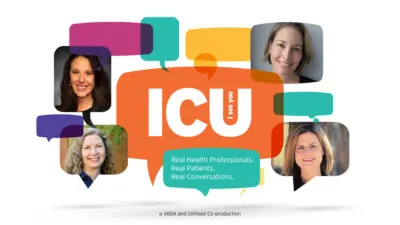
ICU – “I See You” Podcast
Pediatric Vestibular Disorders
Listen Now
Available wherever you get your podcasts.
Did you know that vestibular disorders affect children as well as adults? There are increasing reports of vestibular deficits in children. One study suggests that as many as 1 in 5 children in the United States have problems with dizziness or balance. Pediatric vestibular disorders result in vertigo, gaze instability, delayed motor development, and difficulties with reading. These symptoms are difficult for anyone to cope with, but are especially challenging for children and their families. Pediatric vestibular healthcare specialists are hard to find; it can be difficult for a child to describe their symptoms, and delayed diagnosis can have devastating results. This episode of the ICU Podcast features a pediatric vestibular specialist and the mother of a young child who bravely battled vertigo, hearing loss, and a host of other vestibular symptoms.
Guests
Andi Gilkey is a Licensed Clinical Social Worker and the proud mom of a vestibular warrior. Her son is an amazing 11-year-old who loves baseball, music, video games, and his friends. He has bilateral sensorineural hearing loss, a unilateral Enlarged Vestibular Aqueduct, childhood vertigo, PPPD, and vestibular migraines. An incredible team has supported his hearing journey, but his vestibular journey has been one of the biggest challenges Andi has encountered as a mother. She says it felt like an endless roller coaster full of ups and downs since he was a toddler. Through hard work and the creation of an incredible vestibular team, she is proud to say that her son has been in remission of vestibular symptoms for 10 months. Her ongoing goal is to share her family’s story with others, providing hope and support to the vestibular community.
Jennifer Braswell-Christy, PT, PhD is an Associate Professor in the Department of Physical Therapy at The University of Alabama at Birmingham. Her primary area of research focuses on the development of innovative intervention methods to enhance gaze stability and balance in children with vestibular-related impairments. Related to this area of study, Dr. Christy teaches numerous continuing education courses in the U.S. and abroad.
Hosts
Cynthia Ryan, Executive Director of the Vestibular Disorders Association (VeDA)
Kimberly Warner, Founder and Director of Unfixed Media
This podcast is a co-production of the Vestibular Disorders Association (VeDA) and Unfixed Media.
Summary
This episode of the ICU Podcast delved into the complex world of pediatric vestibular disorders, featuring two remarkable guests: Andi Gilkey, a licensed clinical social worker and mother of a young vestibular warrior, and Dr. Jennifer Braswell-Christie, a leading researcher in pediatric vestibular rehabilitation.
The conversation centered around Andi’s son George, who has battled multiple vestibular challenges since early childhood. George experiences bilateral sensorineural hearing loss, unilateral large vestibular aqueduct, childhood vertigo, and vestibular migraine. His journey began with seemingly typical toddler behaviors that his parents recognized as something more significant – constant movement, inability to settle, and frequent morning sickness.
Dr. Christie explained the critical differences between vestibular disorders in children and adults. Unlike adults who develop vestibular issues after their balance system is fully formed, children with vestibular hypofunction must develop alternative mechanisms to navigate their world. This can lead to progressive developmental delays, challenges in motor skills, and difficulties with learning and reading.
Andi and George’s story highlighted the immense challenges of finding appropriate medical care. The family consulted nearly 20 practitioners before assembling a comprehensive medical team. Many doctors initially dismissed George’s symptoms as behavioral issues, leaving the family frustrated and desperate for answers.
The impact of vestibular disorders on a child’s life extends far beyond physical symptoms. George experienced social isolation, struggled with reading, and faced challenges participating in typical childhood activities, such as jumping on trampolines or playing sports. His friends gradually moved on, unable to understand his invisible condition.
Dr. Christie shared promising developments in pediatric vestibular research. Researchers are now:
- Creating international networks to raise awareness
- Developing more comprehensive training for healthcare providers
- Conducting studies to understand treatment efficacy
- Exploring the connection between vestibular function and learning
The podcast emphasized several key insights:
- Parents must trust their instincts and advocate for their children
- Vestibular rehabilitation is not a linear process
- Children are incredibly resilient
- The brain has remarkable plasticity and can improve with targeted interventions
Andi’s advice to other parents facing similar challenges was powerful: follow your instincts, understand that healing is not a linear process, and know that your child can emerge stronger from these experiences.
Dr. Christie reinforced this message, highlighting the brain’s limitless potential for adaptation and improvement.
George’s story is particularly inspiring. Despite numerous challenges, he has maintained a positive attitude, taking pride in his differences and learning to understand his body’s unique needs at a young age. After years of intensive therapy, he has been in remission from vestibular symptoms for 10 months.
The podcast concluded with a message of hope for families navigating pediatric vestibular disorders. Both Andi and Dr. Christie stressed the importance of persistence, creative rehabilitation approaches, and maintaining a positive outlook. Organizations like VeDA are working to connect families with specialized healthcare providers and raise awareness about these complex conditions. The ultimate goal is to improve diagnosis, treatment, and support for children with vestibular challenges.
This powerful conversation shed light on an often-overlooked medical issue, offering insight, empathy, and hope to families facing similar journeys.
A full transcript is available on YouTube (scroll below the description and click “Show Transcript”).
